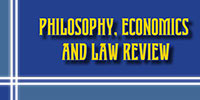Olena GALUSHKO, Cameron BATMANGHLICH
GALUSHKO O., BATMANGHLICH C. (2023), ETHICAL AND PRACTICAL ASPECTS OF USING THE ARTIFICIAL INTELLIGENCE IN THE EDUCATIONAL PROCESS.
PHILOSOPHY, ECONOMICS AND LAW REVIEW. Volume 3, no. 2, 47-52
DOI: 10.31733/2786-491X-2023-2-47-52
Abstract. Philosophical and ethical challenges to the use of artificial intelligence include many aspects, ranging from privacy and data security to issues of responsibility for the actions of AI. The rise of AI is changing the nature of knowledge and the educational process, creating new opportunities and challenges.
The use of AI in the educational process raises not only questions of the technical organization of the educational process and evaluation of the results obtained with the help of AI, but also more global questions about the role of the teacher and student, about the social and ethical consequences of the transition to a new educational paradigm. Artificial intelligence is revolutionizing the education industry in various ways including virtual tutors, personalized learning, automated grading, smart content, intelligent tutoring systems, predictive analytics, student support systems, etc. However, the ethical considerations of implementing AI in higher education must be carefully examined to ensure that AI is used responsibly and ethically in the education sector.
The article discusses the emergence and development of AI, its understanding from a technical and philosophical point of view. The ethical issues of using AI and its role in the human community are discussed. The ethical and practical aspects of using AI in the educational process are analyzed, and actual problems of AI implementation into the studying process in universities are proposed.
Keywords: artificial intelligence, education, ethics, pedagogy, learning process, learning tools.
References
- McCarthy, J. (2007). What is artificial intelligence? URL : https://web.archive.org/web/ 20151118212402/http://www-formal.stanford.edu/jmc/whatisai/whatisai.html.
- 10 Ways AI in Education is Transforming the Industry. (September 21, 2023). URL : https://appinventiv.com/blog/10-ways-artificial-intelligence-transforming-the education-industry/amp/
- Abdoullaev, Azamat. (2023). AI blog on LinkedIn. URL : https://www.linkedin.com/in/azamat abdoullaev-335a0881/.
- Adams, C., Pente, P., Lemermeyer, G. & Rockwell, G. (2023). Ethical principles for artificial intelligence in K-12 education. Computers and Education: Artificial Intelligence, vol. 4, p. 100131. Doi : https://doi.org/10.1016/ j.caeai.2023.100131. URL : https://www.sciencedirect.com/science/article/pii/ S2666920X23000103.
- Artificial Intelligence in Teaching & Learning. URL : https://camosun.libguides.com/ai/ ethicalconsiderations#:~:text=Ethical%20Considerations%20of%20Gen%2DAI%20in %20Higher%20Education&text=These%20range%20from%20academic%20integrity,e nvironmental%20damage%2C%20and%20exploitative%20labour.
- Galushko, I., Galushko, E. &, Veselova, S. (2010). Ynnovatsyonnyy podkhod k reshenyyu dydaktycheskykh zadach vyssheho obrazovanyya [Innovative approach to solving didactic tasks of higher education]. Theory and teaching methods of fundamental disciplines in higher education: Collection of scientific works. Issue VI. Kryvyi Rih: Publishing Department of the NMetAU, pp. 51-56. [in russ.].
- Galushko, O., Veselova, S. & Galushko, I. (2011). Pidvyshchennya kreatyvnoho potentsialu studentiv za dopomohoyu audytornoyi navchal’no-doslidnyts’koyi roboty [Increasing the creative potential of students with the help of classroom educational and research work]. Ukraine’s development strategy in the global environment: Collection of scientific papers, p. 170. URL: https://pgasa.dp.ua/wp-content/uploads/2017/10/1-Galushko.pdf. [in ukr.].
- Galushko, O., Kovalenko-Marchenkova, Ye. & Chistyakov, V. (2022). Didactic aspects of distance learning in the conditions of pandemic and martial law.
- Jobin, A., Ienca, M. & Vayena, E. (2019). The global landscape of AI ethics guidelines. Nature Machine Intelligence, 1, pp. 389–399. Doi : https://doi.org/10.1038/s42256-019-0088-2
- Müller, Vincent C. (2021). Ethics of Artificial Intelligence and Robotics. The Stanford Encyclopedia of Philosophy. Metaphysics Research Lab, Stanford University. URL : https://plato.stanford.edu/archives/sum2021/entries/ethics-ai/.
- Nguyen, Andy, Ngo, Ha Ngan, Hong, Yvonne, Dang, Belle, Nguyen, Bich-Phuong Thi. (2023). Ethical principles for artificial intelligence in education. Education and Information Technologies, 28, pp. 4221–4241. Doi : https://doi.org/10.1007/s10639-022-11316-w. URL : https://www.researchgate.net/publication/364325080_Ethical_principles_for_ artificial_intelligence_in_education.
- Puthiyedath, Anjali Rajan. (2023). A Framework for AI Co-Creation in Pedagogy. URL : https://www.linkedin.com/pulse/framework-ai-co-creation-pedagogy-dr-anjali-rajan puthiyedath.
- Reiss, M. (2021). The use of AI in education: Practicalities and ethical considerations. London Review of Education, 19 (1), 5, pp. 1–14. Doi : https://doi.org/10.14324/LRE.19.1.05. URL : https://www.researchgate.net/publication/349015045_The_use_of_AI_in_ education_Practicalities_and_ethical_considerations#fullTextFileContent.
- Sheikh, H., Prins, C. & Schrijvers, E. (2023). Artificial Intelligence: Definition and Background. Mission AI. Research for Policy. Springer, Cham. Doi : https://doi.org/10.1007/978-3- 031-21448-6_2. URL : https://link.springer.com/chapter/10.1007/978-3-031-21448-6_2.
- Zhang, K. & Aslan, A. (2021). AI technologies for education: Recent research & future directions. Computers and Education: Artificial Intelligence, vol. 2, p. 100025. Doi : https://doi.org/10.1016/j.caeai.2021.100025.
